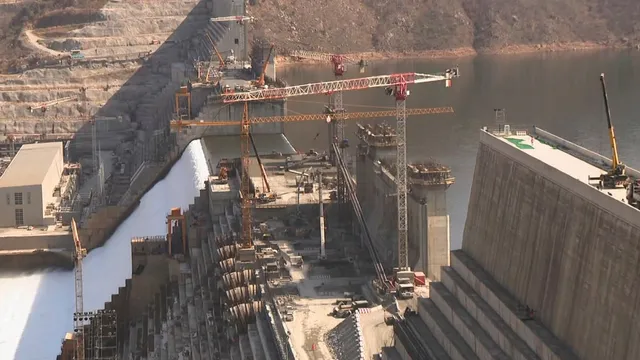
Ethiopia completes controversial Nile dam amid ongoing disputes
2025-07-04 15:31- Ethiopian Prime Minister Abiy Ahmed announced the completion of the Grand Ethiopian Renaissance Dam and its upcoming inauguration.
- Egypt has opposed the dam, raising concerns about its negative impact on the country's water supply.
- The ongoing disputes reveal deeper issues about Nile water rights and inter-country negotiations, leaving future relations uncertain.
Express your sentiment!
Insights
Ethiopia has officially announced the completion of the Grand Ethiopian Renaissance Dam (GERD), a power-generating project on the Nile River that has been a source of tension with Egypt and Sudan. The announcement was made by Ethiopian Prime Minister Abiy Ahmed during a legislative session, where he stated that the dam is set for an official inauguration in September. The GERD, which Ethiopia began constructing in 2011, aims to produce over 6,000 megawatts of electricity and significantly boost the country's energy capacity. It has already started generating power since 2022 and is seen as crucial to Ethiopia's development plans. Egypt has vehemently opposed the dam, expressing concerns that it threatens its vital share of Nile River waters, which are essential for the water supply of over 100 million Egyptians. Egyptian authorities view the dam as a potential existential threat and assert that the fundamental issue at stake involves the legal rights to Nile River water resources. They have accused Ethiopia of lacking the political will to negotiate a binding agreement regarding the dam, despite years of discussions aimed at addressing the interests of all parties involved, including Sudan. As negotiations stalled, the relationship between Ethiopia and Egypt has been strained, leading to rising tensions that, at times, have raised fears of conflict. Egypt's position is that Ethiopia's ongoing construction and operational decisions on the dam should not be unilateral but should reflect collaborative dialogue among the countries sharing the Nile waters. The Egyptian Ministry of Water Resources and Irrigation issued a statement condemning Ethiopia's unilateral actions and referred to the completion of the dam as unlawful, stressing the need for a legally binding agreement. In response, Ethiopian officials assert that the dam is essential for the country's socio-economic development and argue that they do not require external authorization to pursue such projects. Prime Minister Abiy Ahmed reinforced this commitment to the Ethiopian development agenda while maintaining that his country desires common prosperity among the Nile basin nations. However, Egyptian officials see its statements regarding negotiations as superficial attempts to improve Ethiopia's international image while continuing its unilateral actions concerning the dam, which they argue go against principles of shared water management for international river systems.
Contexts
The Grand Ethiopian Renaissance Dam (GERD) has been a focal point of discussion regarding its impact on the Nile River and the communities that depend on it for their livelihoods. The dam, which is located in Ethiopia on the Blue Nile, has been termed as a significant development project that aims to address Ethiopia's growing energy needs and to stimulate economic growth. However, it has also raised considerable concerns among downstream countries, particularly Sudan and Egypt, regarding the potential ramifications on water flow and regional water security. The Nile is a crucial lifeline for millions of people, and the possible alterations in its flow due to the GERD's operations could lead to significant socio-economic challenges. The construction of the dam, expected to be the largest hydroelectric power plant in Africa, aims to produce over 6,000 megawatts of electricity, which Ethiopia plans to utilize for domestic consumption and export to neighboring countries. While the potential economic benefits are noteworthy, they are overshadowed by fears of reduced water availability downstream. Egypt, which relies on the Nile for approximately 97% of its freshwater, expresses concern that the filling and operational strategies of the dam may lead to reduced annual water flow, exacerbating the stress already faced by its water resources. The historical context of water rights, treaties, and the nature of cooperation among Nile Basin countries plays a crucial role in these discussions. Furthermore, the filling of the dam's reservoir is a significant concern for Sudan as well, given its proximity to the GERD. Sudden changes in water levels and the potential for increased flooding during the filling process pose risks to Sudan's own infrastructure and agricultural systems. The Sudanese government has been keen on clarity and stability regarding the GERD's operations, advocating for agreements that would ensure the protection of its citizens from the adverse impacts of both reduced water flow and flooding. Collaborative management of the Nile waters is essential for ensuring that all countries can equitably share the river's resources without detriment to any stakeholder. In conclusion, while the Grand Ethiopian Renaissance Dam represents an important step towards development for Ethiopia, it also carries significant implications for the Nile River and the surrounding nations. Ongoing negotiations and dialogue among Ethiopia, Sudan, and Egypt are crucial in forging agreements that will manage the complexities of water resource sharing. The future management of the Nile requires an integrated approach that respects the needs and rights of all basin countries while promoting sustainable development practices. The balance between development and conservation will determine not only the future of the GERD but also the socio-economic well-being of millions who rely on the Nile's waters.